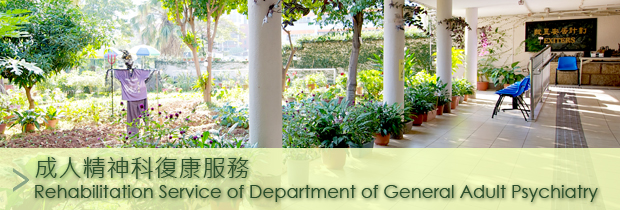| Home > Our Services > Rehabilitation Service of Department of General Adult Psychiatry |
Rehabilitation Service of Department of General Adult Psychiatry
Introduction
The rehabilitation service of Castle Peak Hospital provides a variety of programmes for the acute, medium and long stay patients. The programmes are run by multi-disciplinary team and are tailor-made according to the needs of the clients. Some of the clients receive rehabilitation in their original wards. Others requiring more intensive training are referred to the training centre and the wards run by the Rehabilitation Team.
Introduction
The Centre for In-patient Daytime Programme (CIDP) was established in August 2009. Apart from rendering a comprehensive range of daytime rehabilitation programmes to the general adult in-patients, it also provides mental health education, social and emotional support to carers.
Vision
We strive to empower our service users to perceive themselves as an enabler.
Mission
Our rehabilitation services are collaborative, person-directed and individualised. By developing the culture of empowerment and optimism, service users join our programme based on their needs; their rights to choose the programmes they like are respected. Service users are encouraged to participate in decision about the service they receive. Their capacity is of primary concern to our programme design. CIDP is a platform of co-ordination between wards, helping professionals and voluntary agencies. Rehabilitation programmes are delivered through partnership.
Scope of Services
- Mental Health Education
- Spiritual Support
- Psychological relief
- Impulse Control Training
- Cognitive Rehabilitation
- Community Living Skills Training
- Leisure Programmes
- Physical Fitness
- Self-Care Training
- Relative Forum
- Work Activities
Service Hours
| Monday to Friday |
9:00 am - 12:30 pm 1:30 pm - 5:00 pm |
|---|---|
| Saturday | 9:00 am - 1:00 pm |
| Sunday and Public Holiday | Closed |
Pamphlet for Download
Introduction
Rehabilitation wards provide a step-wise therapeutic environment to facilitate integration into the community. Initial training is being carried out by medium stay wards, in which the clients will be empowered with some freedom within the hospital setting.
All clients receive a multi-disciplinary assessment to determine their strengths and areas for improvement. An individualised care plan is drawn up, with active input from the client. Coordinated rehabilitation activities are arranged for the clients. The care plan is regularly reviewed. The care plan is handed over to carers of the discharge destination to ensure continuity of care.
Examples of Training
- Health Education
- Skill training, including social skill, budgeting skill, self-care skill, domestic skill, etc.
- Community orientation
- Relative support group - counseling and training
- Information / liaison centre for Community support resource network
- Recreational activities and leisure habits training
- Model Home training
- Occupational training, including work assessment, working training, job acquisition, skill training, on-site practice, etc.
- Visits to community rehabilitation facilities, e.g. halfway houses, long-stay care home, sheltered workshops














